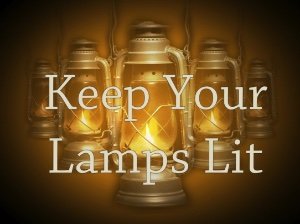 Don’t Forget the Oil: Advice on Disaster Preparedness
Don’t Forget the Oil: Advice on Disaster Preparedness
–Joannie Collins, Diocesan Risk Officer
In the parable of the ten bridesmaids in the Gospel of Matthew, chapter 25, we are reminded that it is wise to be prepared for sudden events. This is a good scriptural warrant for emergency preparation in our parishes.
As with this parable, emergency preparation teaches that rushing to prepare leads to mistakes, such as not putting gas in the car (if the power goes out, gas station pumps won’t operate), forgetting to order life-saving prescription medications, not storing enough water (that’s one gallon per person per day) or batteries (fresh batteries) for when the lamps exhaust their power supplies. The same goes for not remembering the cell phone charger for your car and not having a way to communicate with family or first responders because the phone quit.
So, what’s it got to do with parishes and missions? Suppose your parish does feel the hand of a nor’easter or hurricane. Where would you hold your services? Could you describe the stained glass windows? Do you have a video inventory of precious items? Do you have copies of important documents, such as insurance policies? How many square feet is your church? How would you communicate with your congregation? Something as simple as developing a communications plan, preparing an electronic video inventory with copies secured elsewhere and planning an alternate worship site saves time and torment.
How can churches play a key role in aiding its community during a man-made or natural disaster? The answer: By stepping up. Play an active role in mitigation and preparation. Offer itself to its community as a place of refuge, volunteer, or develop a relationship with local emergency management, and a whole lot more.
The Federal Emergency Management Agency (FEMA) recognizes the benefit a house of worship has on community preparation, response, and recovery and Rhode Island Emergency Management recently added Essential Support Function (ESF) 17 to the State’s plan . FEMA offers free (doesn’t get better than that) courses in all facets of disaster preparation. Here are just a few from FEMA’s course catalog:
- IS-360 Preparing for Mass Casualty Incidents: A Guide for Schools, Higher Education, and Houses of Worship.
- IS-907 Active Shooter: What You Can Do
- Guide for Developing High Quality Emergency Operations Plans for Houses of Worship
- Other FEMA resources
Locally, all municipalities offer Community Emergency Response Team (CERT) training. Check with local emergency management agencies for times and training. Click here to locate your area contact. Invite him or her to discuss ways to help or be of help. Additionally…
- Your church building could serve as a staging area. A place for emergency responders to stage supplies to save response time.
- Could you open your doors to offer coffee to those without power? How about allowing the public to charge their phones? Would you lend your parking lot to accommodate trailers carrying washers/dryers/showers, so residents have clean clothes or emergency generators?
- Could meals be served to residents in your parish hall?
If you don’t feel equipped to help, the power of a dollar helps tremendously. Consider donating to Episcopal Relief and Development (ERD). This agency steps in to aid parishes impacted by disaster throughout the country. Your donations help fulfill their mission.
Need more information? Contact us.
So, don’t forget to develop your emergency plan and, for heaven’s sake, don’t forget to keep your lamps filled with oil, or as Jesus might say today, rechargeable batteries!
